Reader's Choice: Hitchcock's Troubling Divisive "Marnie" (1964)
 Saturday, April 15, 2023 at 5:29PM
Saturday, April 15, 2023 at 5:29PM Each weekend Nathaniel we'll be discussing a movie requested by you! SPOILERS ahead so if you haven't screened this on Netflix do that first.
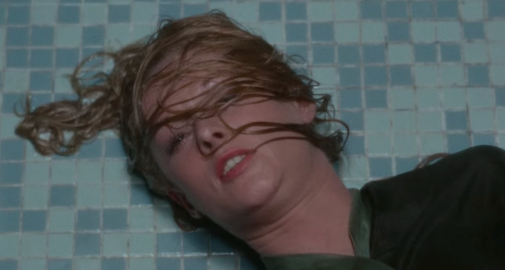
The idea was to kill myself, not feed the damn fish.
Who is the most f***ed up character in Alfred Hitchcock's Marnie (1964)? The answer is not as simple as it appears. The titular ice queen blonde (Tippi Hedren) is sexually frigid, terrified of lightning, a compulsive liar, a serial thief, and disassociates almost instantly at the sight of the color red. She has so many issues she's a full series of crazy. But while Marnie is a loner she's hardly alone in her own film when it comes to needing serious amounts of therapy...
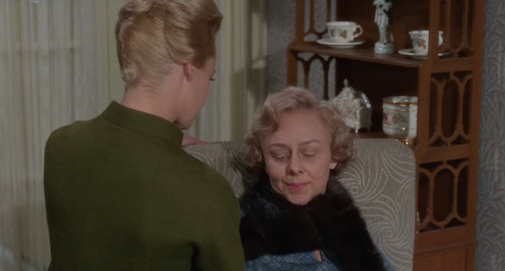 Where was Louise Latham's Best Supporting Actress nomination?
Where was Louise Latham's Best Supporting Actress nomination?
Mark Rutland, her boss / captor / husband (Sean Connery at peak Thunderball hotness), probably looked sane to moviegoers once upon a time (aka 1964) but he's not of sound character or mind either: impulsive, shifty, amoral, manipulative, sexist, enabling, also a liar... and rapey, too.
Then there's Marnie's ailing mother Bernice (an impressive turn from Louise Latham) a life-long liar and guilt-ridden former sex worker. To up the competitive ante of "troubled" on display, Bernice is also judgmental, avoidant, repulsed by her daughter's touch, and passive aggressive about any and all maternal expectations. Even her homemade pecan pie is weaponized to withhold love rather than give it. Even at film's end when the truth is finally out, and Bernice has declared that she does actually love her daughter she still can't give that love out, shooing away her daughter again.
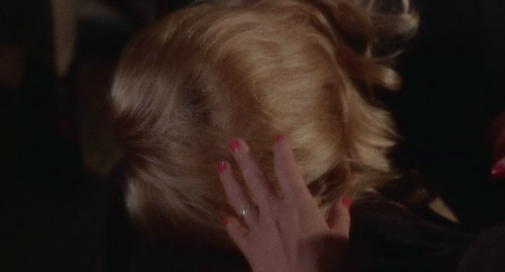
Get up Marnie, you're aching my leg.
With all of these complete psychological messes vying for screen time Mark's sister-in-law Lil Mainwaring (Diane Baker) comes across as positively well adjusted. It's all relative of course. Her big (terrific) scene, for example, is like Red Flag Word Salad...
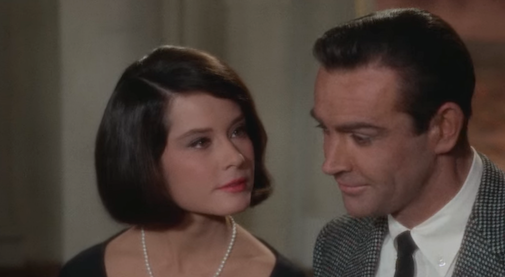
Lil: I have absolutely no scruples. I'd lie to the police or anything... I'm just offering you my services: Guerilla fighter, perjurer, intelligence agent.
Mark: You seem to be growing up Lil. I expect what we should do is find you some young man. What's your type?
Lil: I was waiting for you. I'm queer for liars.
Lil is trying to raise Mark's cool temperature with that last insult but Baker's performance is charismatic and skilled enough that you also know it's true.
To love Marnie (1964) as a whole, a divisive picture within Hitchcock's treasure-trove of a filmography, might actually depend on sharing Lil's kink. Are you queer for liars... and, thus, Marnie itself?
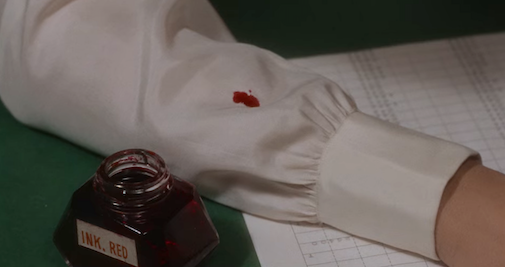
I personally struggle with this 1964 picture which was only a modest success upon release. Though it has collected ardent fans since, its qualities are easier to intellectually and aesthetically admire than to be emotionally invested in or excited by. Hitchcock's films always provide the former and his classics also provide the latter. Once again the filmmaking is top-notch. Was there ever a filmmaker better than Hitchcock at shooting places, items, accessories, costumes, and making them not just characters but fetish objects? The camera (cinematography by Robert Burks, in the last of his Hitchcock collaborations) consistently zeroes in on things like keys, vaults, bags, doors, guns, desks, money, written instructions, phones, and of course colors and costume elements. Many of them take on the weight of Chekhov's gun and you know they'll go off eventually which is half the fun.
Hitchcock's films sometimes get too plotty (Marnie definitely is) but he's a supreme visual storyteller. You can play "Best Shot" with any of his movies and have a ball. Here are my three personal bests from Marnie...
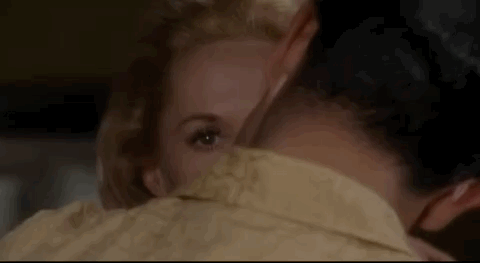
Bronze: This dreamlike shot of Marnie, disassociating as her new husband kisses her is visually thrilling -- how did they shoot this given the movement to the bed? -- but it's also too disturbing to be a "favourite" shot as its easy to interpret the moment as a rape scene.
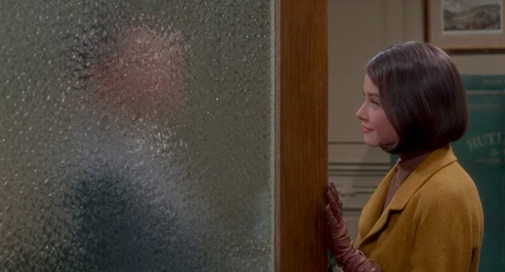
Who's the dish?
Silver: The first third of Marnie is all set up and Lil is the last main character that we meet. Her introduction is simple enough on the surface but there are a lot of moving pieces given the plot and the interpersonal dynamics which are all forming in this one scene. This shot which "ends" her introduction is brilliant. By entering the office Marnie happens to be staring at (this is Marnie's POV) Lil becomes the temporary obstacle. She's blocking Marnie's view of the vault with all the delicious money in it and she's also talking to Mark Rutland (the boss) who we cannot see or hear in this shot. With the door splitting the frame, Mark and also Mark's motives and also Mark's feelings about the women in his life (both Lil & Marnie) are literally made opaque.
Cheekily, Lil closes the door on us and, thus, Marnie. It's as if she knows we're all staring.
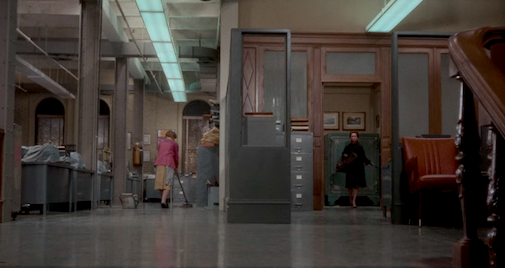
Gold: You could -- and someone surely did -- write thousands of words about Marnie's most bravura sequence when our serial thief, thinking she's alone, makes her move on the Rutland vault. She doesn't know a cleaning lady has entered the office. Hitchcock doesn't quite give this scene the Rope treatment as there a few key edits but he holds this particular shot for an agonizingly fun length of time as we fear that our icy amoral "heroine" will be discovered and we also wonder when she will realize she's not alone. Just as exciting as the shot composition is the choice of the sound. This is the one key sequence where there is no score at all so it's about listening to the mop sloshing on the floor and wondering if Marnie will hear it... or be heard if she doesn't step carefully away from the scene of the crime.
Maybe lose those high heeled shoes, Marnie?
Speaking of shoes. All the close-up granted fetish objects -- like that vault which we see multiple times -- do come back around and pay off. But there's little that's truly thrilling about the resolutions (apart from the entirety of this scene which begins, continues, and ends perfectly). So when the film comes to a close, it just kind of ends, risking a flatness that rivals the matte paintings that frame Bernice's Baltimore street where Marnie was so traumatized as a child.
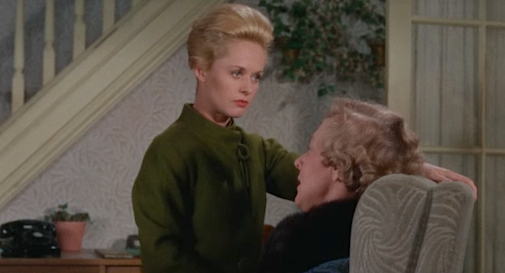
Decent women don't have need for any man. Look at you, Marnie. I told Miss Cotton. Look at my girl, Marnie. She's too smart to go getting herself mixed up with men. None of 'em!
Would it help if Marnie (and Marnie herself) were queerer? It's easy enough to "read" the protagonist's pathologized lack of interest in sex as coming from a place of either asexuality or sapphic tendencies than from childhood trauma. Still the film, not to mention Tippi Hedren's uneven star turn -- never really indulge a queer reading in the way some of Hitchcock's greater films (Rope, Strangers on a Train, Psycho for example) and more psychologically adventurous actors do. Though attempts at remaking Hitchcock films are usually giant wastes of creative energy, Marnie might just be the movie that someone should take another stab at.
Marnie's place in Hitchcock's canon is also troubled by sheer chronology. After four consecutive widely beloved films that are often considered masterworks (Vertigo, North by Northwest, Psycho, and The Birds) -- a prolific hot streak that has only rarely if ever been equalled by another auteur -- Marnie, can't help but pale in comparison. Hitchcock only made four more movies after this. They're not entirely without magic (especially 1972's Frenzy) but, as with the best moments of Marnie they're just that... moments. The masters last five films have flashes of hot red genius that widen your eyes and quicken your pulse. But like Marnie you come to your senses too quickly, never fully transported but only temporarily jolted alive.
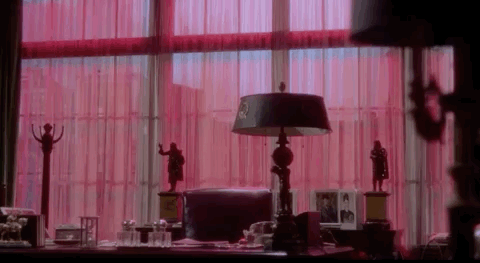
Previously: Babette's Feast (1987) and Dick (1999)
Next weekend: Fatal Attraction (1987)



Reader Comments (16)
OOF. Can't believe we were denied a BOUND recap for this.
Marnie is such a tough sit, so I didn't subject myself to it again, but at least it has Connery at his hottest. And I think any cinephile should at least see Marnie once.
You're about the cleaning lady sequence. It's incredible.
Marnie is not the best movie but it does contain the best performance from Hedren. This is a big step up from The Birds. Had Hitchcock not interfered, I think she would have had a successful career, or at least an opportunity for more challenging roles.
It's very interesting, particularly when you consider the so-called "guilty woman" complex in Hitch's films.
Hedren is great, she's icy, stoic, her face is a mask made of coldness and emptiness.
Always remember guys, a "lesser" Hitchcock is still remarkable.
I do think it's an amazing film as Tippi Hedren is great. It's a shame her career never became bigger after this and shame on Hitchcock for that.
The shots you pick out are reminders - this might not be beloved Hitchcock but it looks *great*. And the mix of visually interesting styles (while fitting together as a whole), the robbery section vs. all the stuff with the Baltimore setting, that fantastic "Bronze" shot above, as much as any Hitchcock this is visually striking. And yeah, how it's sometimes hard, sometimes icy, sometimes withdrawn, how it never quite settles into a groove ... it's not top 5 Hitch or anything, but I think it's one of the more interesting ones to talk about.
Thanks for the fun write up Nathaniel! I hadn’t seen this in over 20 years… had forgotten quite how bonkers the plot is, but it was how great it looked that really surprised me this time too!
To prepare for the Marnie discussion, I re-read the source novel “Marnie” by Winston Graham, which is set in England. Graham also wrote the hot and heavy potboiler series, The Poldark Saga, which is enjoying another resurgence on British tv.
Hitchcock kind of de-fangs the novel, taking out the foundation stones of:
1) The British class system: oppressive, unforgiving, vindictive.
2) the punishment for Passing: passing for a higher social class than you were born into, incurs the violent wrath of privileged white men who feel threatened.
The background is always simmering at a boiling point anxiety of terror at being thrust back into poverty with its humiliations, deprivations, and helplessness in face of illness (it’s set before the British National Health).
Marnie has the type of job open to poor persons. It pays 2 pounds a week (about 10 dollars). Not enough to support one person, let alone two, Marnie and her mother. So Marnie takes a bookkeeping course and has elocution lessons, to pass as middle class. But a middle class female employee still makes a pittance (because misogyny).
So Marnie has to create a new profession for herself, white collar criminal, stealing the funds from companies where she works under assumed identities. Doing this, she makes about as much as a well paid white male who is good at his job.
Marnie is continually told that she is Wrong.
As a poor girl, she is too smart, too good at math (unnatural in a girl), too unyielding, no fun.
As a middle class female employee, she is too efficient, too good at math (unnatural in a woman), no fun (drab assumed identity to escape surveillance).
As a middle class wife, she is sexually unavailable. “You’re a pretty girl, Marnie. You were made for love”. Yep. Woman has no interest in having sex with the guy, she’s frigid. Time for contemporary psychological mores, where deviants are fixed.
So if Hitchcock takes away Class Warfare and Punishment for Passing, what’s left?
Trauma and lots of it. But it’s kind of free floating, unmoored.
He does a neat filmic expression of the situation of trauma with its triggers and patterns and lack of control, and the attempt to gain control by theft with its brains, coolness, and anxiety. His additions to the plot, like the cleaning lady and the sister in law, give a film expression to the novel’s exposition.
Reducing issues to personal guilt, still makes us uneasy and impatient. So yeah, tricky movie.
David S -- would that I had had time for both!
Mike & Scott C -- totally agreed. it's essentially even if its not essential ;)
Tom -- i never know what to think of Hedren. Marnie is such an impossible role and in some scenes she's amazing but other times I wanted the subliminal clarity that another actor might have brought.
MCGirl -- Wow. You went all out. Thanks for such interesting context. Adaptation really is a minefield isn't it. Whether or not you're faithful the thing *will* change.
I love it for it's complexity and rewatachability,I notice something new everytime,it has of course a quartet of stellar performances.
Louise Latham is fantastic my personal 1964 Supporting Actress winner and I just love all her revelation scenes,Baker is a minxy deceitful delight and Connery is much better than I remembered,Hedren is uneven but still captivating.
I always watch the film wondering what Marilyn Monroe would have done with the role had she lived and been cast,I find it amazing Hitchcock never considered her for roles before Marnie.
So pleased this was chosen over Bound.
Nathaniel, looking at Marnie reminds me of that other Hitchcock novelist, Patricia Highsmith (Strangers on a Train).
In her Tom Ripley novels, Highsmith never gives a psychological reason. Ripley looks at worthless rich kids and thinks, I would be so much better at being rich than you. And he is. Just straightforward.
In 5 books, Ripley continues his successful criminality, and his rich life becomes more satisfying and beautifully curated. I guess that’s why they call Highsmith subversive.
Yet in the many Ripley film adaptations, some directors just cannot resist having Ripley caught and punished. I’m not sure why they feel it’s necessary to do this.
Hitchcock was a masterful director .. but Marnie was a bad movie, ever back then and Hedren was a dreadful actress.
For you all that think Hedren was a great actress... she never ever did another part other than The Birds ... and she was dreadful in that, too.
I'm with Mr Ripley79, this film is immensely rewatchable. And yes, DrG, bonkers. Bound is fun, but to quote Todd McCarthy it has "no more depth than a storyboard."
Of course, Tippi Hedren continued working as an actress after Marnie. The 93 year old has nearly 100 credits (I Heart Huckabees, Pacific Heights and The Countess from Hong Kong). Hedren's most infamous performance is in a self-funded picture called Roar about a naturalist in Africa whose family comes to visit and is confronted by a pride of wild lions. Roar made two million on its 15 million dollar investment.
During the four year filming, Tippi Hedren's daughter Melanie Griffith was attacked by a female lion and received severe facial lacerations requiring reconstructive surgery.
Hedren herself suffered numerous injuries including a bite to her head from a lion, a scratch on her arm from a cougar and a bite on her chest from a cougar. Her most serious injuries came from an elephant the left the actress with fractures to both her hand and ankle.
Roar's cinematographer was Jan de Bont who much later in his career directed Speed and Twister. During filming he was mauled. Doctors restored his scalp with 120 stitches. Once recovered from the injuries, he returned to complete filming.
Since most of the attacks were filmed and included in the final cut, the movie does have a voyeuristic allure.
Nathaniel, thanks for the entertaining review! I hadn't seen this in more than two decades, and I had forgotten how insane the plot is. This time, however, I was really surprised by how great it looked! Star Trek Picard Season 3 Leather Jacket
Im really impressed your articles.I suggest you to do more articles like this.your articles was fantastic.
estate and gift taxes lawyer